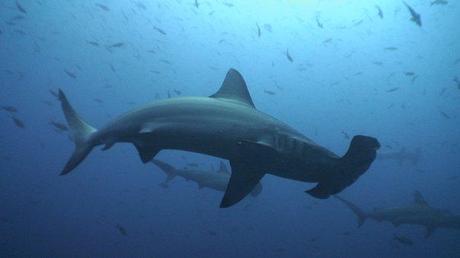
Photo courtesy of Aggressor Galapagos
Saving sharks through shark tourism may sound like a contradiction of terms and certainly some tourists want to avoid sharks, think surfers and swimmers, but there is a select group of scuba divers that seek out sharks and will go to the ends of the earth to do so. In honor of European Shark Week which runs Oct 15 – 23rd, this post is dedicated to saving sharks.
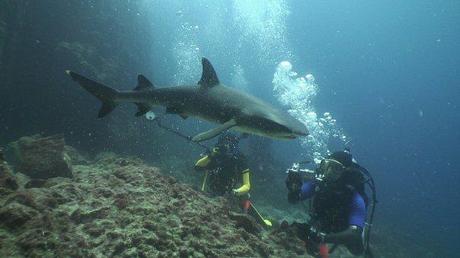
Photo courtesy of Aggressor Galapagos. Fellow divers hanging out with a White-tip reef shark.
I met my husband on Cocos Island, the world’s largest uninhabited island located over 500km (~330 miles) from mainland Costa Rica. Cocos is one of the few places in the world where hammerhead sharks school in large numbers. The only way to reach Cocos is by a 30 hour boat ride and overnight visits are not permitted, so divers wanting to dive at Cocos must stay on a liveaboard. Cocos is a national park and shark finning (the cruel practice of cutting of the shark fins, then throwing the rest of the shark in the water to drown or to be eaten alive, all for a bowl of shark fin soup) is illegal, but unfortunately is an all too common occurrence due to the lack of government funds to patrol the waters on a more frequent basis. I am hopeful that one day Cocos waters and its sharks will be protected, if not by the government, then by the dive companies who operate there to create a sustainable shark tourism industry, as has happened at Wolf and Darwin Island in the Galapagos.
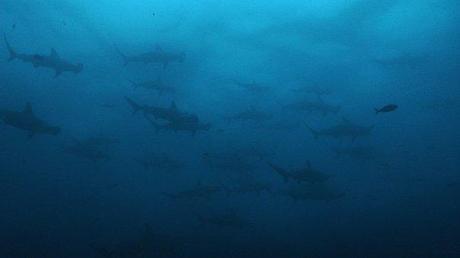
Photo courtesy of Aggressor Galapagos. A typical dive at Wolf and Darwin Islands in the Galapagos with hundreds of hammerhead sharks. Spectacular!
Wolf and Darwin Islands in the Galapagos are also home to hundreds of schooling hammerheads, not to mention a variety of other shark species including Silkies, Galapagos sharks, and in summer, whale sharks. On one dive alone I counted over 500 sharks! The dive companies have come together and now have a patrol boat at Wolf and Darwin Islands to enforce the ban on shark finning. The dive boat companies know that without the sharks there is no shark tourism, so it is more economical to pay for law enforcement and keep the sustainable shark tourism industry going for the long term.
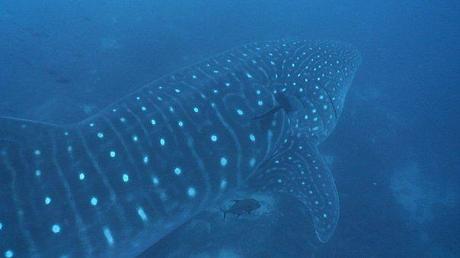
Photo courtesy of Aggressor Galapagos. Whale shark, the largest fish in the ocean, measuring up to 15 meters. We saw 4 alone on our Galapagos trip and 1 in Cocos. This guy has some damage, likely caused by a boat on his right gill. Some people wait a lifetime for a glimpse of a whale shark.
Perhaps the best example of shark tourism in action is in the pacific island nation of Palau, which has created the world’s first shark sanctuary. Studies conducted there show that a single reef shark brings in $1.9 million USD over its lifetime – and that’s just one shark. Shark tourism alone brings in over $18 million USD to Palau, accounting for 8% of the nation’s GDP. See Priced Off the Menu? Palau’s Sharks Are Worth $1.9 Million Each for more info.
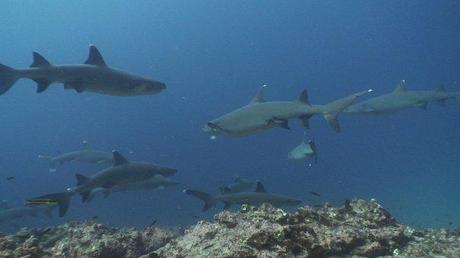
Photo courtesy of Aggressor Galapagos. White tip sharks "the little guys", but they can sure be aggressive when hunting at night! Fortunately they leave divers alone.
Besides the fact that I love diving with sharks, I went to Palau last year to show my support for the Shark Sanctuary – to put my money where my mouth is so to speak. Shark tourism was also what brought me to Cocos and the Galapagos. If I’m going to go way out of my way, endure long flights and an expensive trip, it has to be something really special – and for me that’s the privilege of diving with sharks in their natural habitat - no cages and no bait.
On a volunteer marine conservation holiday in Scotland, I didn’t have the chance to dive with sharks, but we did discover a new place with over 50 basking sharks, the world’s second largest shark. The scientist on board told us the information we collected would be used in making conservation recommendations to the government.


